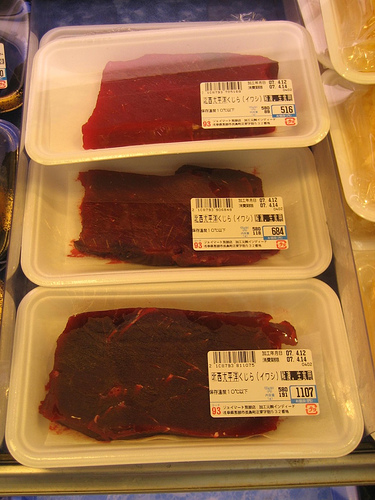Whaling is a very ancient tradition in many countries where fishing is a primary activity and Japan is one of those having practiced whaling for some thousands of years. In the 1980s, though, the necessity of a break in the indiscriminate killing of cetaceans made the international community intervene and establish rules to follow in order to prevent the extermination of the species.
Since 1986, when the International Whaling Commission (IWC)'s moratorium was enforced, commercial whaling is prohibited in Japan. Only scientific whaling is allowed. But this is often regarded by environmental organizations and anti-whaling countries as a mere cover to continue the commercial hunting as id: matumo sums up [ja].
1982年の今日、国際捕鯨委員会で1986年からの商業捕鯨全面禁止案が採択されました。日本では、約8000年前の縄文時代からから捕鯨が行われていました!
また、長崎県壱岐市の原の辻(はるのつじ)遺跡からは弥生時代の捕鯨の跡が出土しています。
現在では、調査捕鯨のみが許可されていますが、調査の名目で、捕獲されたクジラが食用になったりしています。
In Japan whaling has been practiced since the Jomon Era, around 8000 years ago and some ruins found in Iki City of Nagasaki Prefecture brought to light evidence of continued whaling in the Yayoi Era.
At present only research whaling is allowed, but a lot of whales hunted become food under the guise of ‘scientific’ research.
Last year, in June, two activists members of Greenpeace Japan were arrested for stealing a box of whale meat from a scientific whaling fleet, which they presented to Tokyo Public Prosecutor to expose a whale-meat smuggling scandal.
A blogger reports [ja] one of the indicted, Jun'ichi Sato,'s words.
佐藤さんの話に戻るが、敗戦直後の日本人の栄養補給のため、マッカーサーが日本の南極捕鯨をOKした。我々の年代は良く知っているが、小学校の給食に鯨肉がよく出てきたものだ。
1980年代になって鯨の乱獲から南極が鯨保護区になり(種の保全)、商業捕鯨が禁止となったが、日本はその取り決めを拒否した。
In the 1980s savage whaling and the trade of whale meat were banned and the South Pole became a safe area (for the protection of the species) but Japan rejected that resolution.
そして日本は「調査捕鯨」という名目で今でも年間1400頭獲ってる。(実質は商業捕鯨)
しかも水産庁が「共同船舶株式会社」という会社に調査捕鯨を委託し、年間12億円の助成を出している。(国営事業)
調査捕鯨の内部告発として「捕鯨ノルマがあるが、もともと捕獲した鯨をすべて曳船できず”獲っては捨てる”を繰り返している」という。(驚)
According to a source within the scientific whaling fleet “there is a quota for whaling but all the hunted whales cannot be towed, so it is a continuous ‘whaling and throwing away’”. (I'm surprised at this.)
Sato-san, who risks with his companion up to 10 years of jail for theft, comments [ja] on the question in his blog.
日本では多くの人が、「クジラが魚を食べすぎて私たちが食べる魚が減少している。クジラは間引いたほうが良い」というプロパガンダを信じていると思います。このプロパガンダは日本鯨類研究所が長年にわたって使ってきた(*1)ものですが、昨年、国際自然保護連合(IUCN)がそれを否定する決議を採択したこと(*2)や、海外の科学者らがこの議論を批判しているのを意識したのでしょうか、森下氏はこのプロパガンダが科学的に結論づけられたものではないと明確にしたのです。
Such propaganda has been spread by the Institute of Cetacean Research (1) but last year, the International Union for Conservation of Nature (IUCN) adopted a resolution which refuted such a belief (2) Also the fact that it is now clear that foreign scientists criticize that theory made Mr. Morishita [a Japan Fisheries Agency Counselor] concede that the propaganda had no scientific grounds.
[…]
この日、オーストラリアのギャレット環境相は、南極海におけるクジラを殺さない科学調査を2009年から2014年にかけて行う計画を発表しました。この計画は、あらゆる国の科学者の参加を促し、毎年IWC科学委員会からのアドバイスを受けながら計画を調整していくという点で、日本の調査捕鯨の進め方とは大きく異なります。
The scientists of all countries were invited to participate in this project and every year they will carry out the research while receiving advice from the scientific commission of IWC, a method which greatly differs from the way Japan chooses to carry out its ‘scientific’ hunting.
[…]
日本は、この調査提案に参加を表明していません。しかし、本当に日本が南極の鯨類調査に真剣であるのなら、クジラを捕殺しないこのような調査に参加し、南極で捕獲しなければならないクジラの数を減らしていくという姿勢が求められるでしょう。そうでなければ、「調査捕鯨」の目的が科学調査以外にあることが明白になってしまいます。
(1)「クジラが食べているのはサンマやサケ、スケトウダラなど、人類が漁業資源として利用しているものも多く、その量は世界の漁獲高の3~5倍。人類の食料となる水産資源への影響は絶大です」(日本鯨類研究所パンフレット「クジラの調査はなぜやるの?」)
(2)IUCN「鯨類と漁業の関係に関する決議」 (PDF)
(Pamphlet of the Institute of Cetacean Research Why do we make research on whales?)
(2) IUCN Relationship between fisheries and great whales [pdf, en]
At the beginning of this year, The Cove, an investigative documentary on the whaling issue was presented at the Sundance Film Festival and received the Audience Award. Id:ekojin gives us some details [ja] of the film.
和歌山県東牟婁郡太治町(たいじちょう)。
今後この漁業の町が、日本国内で大きな注目を浴びることになるかもしれない。
アメリカのサンダンス映画祭で2009年度観客賞を受賞したのが、「The Cove」(入り江)。
「反捕鯨」のドキュメンタリー映画らしい。
From now on this village, whose living depends on fishing, is likely to get a lot of attention from the whole country!
The Cove got the audience award at the American Sundance Festival of 2009.
It is a documentary film against whaling.
伝統的にクジラ漁で栄えたこの町で、密かに年間20000頭ものイルカが殺されており、鯨肉として売られている。
さらに、その肉にはメチル水銀などの有害物質が検出されており食べるのに適していない。
のみならず、そのイルカは海外向けに闇取引されている。
これらの「事実」を多くの日本人は知らされていない。
開放的な民主主義国であるはずの日本に厳然と存在する「暗部」だ、、、
というのが主旨らしい。 どうやら。
Plus, those dolphins are also traded in a shady business with foreign clients.
These facts are unknown to many Japanese. It is a ‘dark side’ that clearly exists in a country which is thought to be a liberal democracy…
This is what the film is about.
Trailer of The Cove








2 comments
I saw the Cove and was disgusted by the indiscrimate culling of dolphins. The film claims that 70% of the world’s population rely on seafood for protein in their diet. It is an incurable disease on the planet that people will dominate anything they can put their hands on. I for one after watching this film will switch from my seafood diet to a seafood and meatless vegetarian diet because otherwise, I would be condoning the slaughter of 23, 000 dolphins in Taiji each year. People need to stop being focussed on themselves and superficiality and be more concerned about compassion and consideration for all other living beings and the Earth.